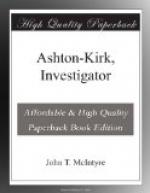“While you were drawn up in Christie Place, waiting for a fare,” he asked, “did you hear or see anything at 478?”
“I saw a light on the second floor—something I never saw before at that hour. And I saw the Dutchman that keeps the store underneath shutting up. And I heard somebody laughing upstairs,” as a second thought. “I think that’s what made me notice the light.”
“Nothing else?”
Sams shaved and considered. He wiped his razor at last, poured some water in a bowl and doused his face. Then he took up a towel and began applying it briskly.
The investigator, watching him closely, saw that he was not trying to recall anything. It was plain that the man was merely calculating the possibilities of harm to himself and patrons if he told what he knew.
“There has been a murder,” said Ashton-Kirk, quietly, thinking to jog him along.
Sams threw the towel from him and sat down upon the bed.
“A murder!” said he, his eyes and mouth wide open. “Well, what do you know about that.” He sat looking from one to the other of them, dazedly, for a space; then he resumed: “Say, I thought there was something queer about that stunt of hers!”
“Tell us about it,” suggested Ashton-Kirk, crossing his legs and clasping one knee with his hands.
The cabby considered once more.
“There’s lots of things that a guy like me sees that look off color,” he said, at length; “but we can’t always pass any remarks about them. It would be bad for business, you see. But this murder thing’s a different proposition, and here’s where I tell it all. Last night while I was waiting in front of McCausland’s, I hears an automobile turn into the street. It was some time after I got there. I wouldn’t have paid much attention to it, but you see there’s a fellow been trying to get my work with a taxicab, and I thought it was him.”
“And it wasn’t?”
“No, it was a private car—a Maillard, and there was a woman driving it.”
The chair upon which Pendleton sat was an infirm one; it creaked sharply as he made a sudden movement.
“She was going at a low speed,” proceeded Sams, “and as she passed Hume’s I noticed her look up at the windows. After she disappeared there wasn’t a sound for a while. You see, nobody hardly ever passes through Christie Place after one o’clock. Then I hears her coming back. This time she stopped the car, got out and went to the door that leads into Hume’s place. There she stopped a little, as though she didn’t know whether to go in or not. But at last she went in.”
Pendleton coughed huskily at this point; and his friend glancing at him saw that his face was white.
“And up to that time,” said Ashton-Kirk, “are you sure that there was no movement—no sound—in the front room at Hume’s?”
“As far as I noticed, there wasn’t. But a few minutes after I heard the woman go in, I did hear some sounds.”




